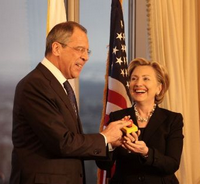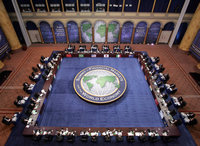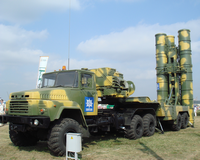Spencer Ackerman introduces us to the new SACEUR (Supreme Allied Commander Europe, otherwise known as NATO’s military commander), Adm. James Stavridis. It’s the first time a Naval officer has held the post. Note that the alliance, along with the rest of the world, is currently engaged in anti-piracy patrols off of Somalia. That also corresponds to a shift in strategic focus among Western general staffs towards the Indian Ocean and Asia as the most likely threat horizon, with an emphasis on naval rivalries. This is admittedly tea-leaf reading, but I wonder if this doesn’t represent Washington’s desire to reassert the […]
Europe Archive
Free Newsletter
Nikolas Gvosdev echoes a lot of what I’ve been writing and thinking about NATO and the EU in recent weeks: NATO expanded at a time when Russia seemed prostrate and Article 5commitments could be extended without much thought — then came theRussia-Georgia war. Plus NATO’s continued unraveling over Afghanistandoesn’t inspire much confidence. Twenty years ago, NATO as asmaller group was much more formidable — and the EU was born atMaastricht with a smaller number of states whose economies were muchmore aligned. Are either stronger today as a result of expansion? I’m not sure if “stronger” is the right word. I’d […]
The folks over at Foreign Policy were kind enough to invite WPR managing editor Judah Grunstein to contribute a piece on France’s reintegration of NATO. Here’s a taste: Sarkozy’s decision is part of a broader shift towardreaffirming France’s place in what he calls the “family of the West” — aproject he began upon taking office in May 2007. In concrete terms, that hasmeant a more vocal opposition to Iran’s nuclear ambitions, a recommitment tothe NATO war effort in Afghanistan, and demonstrations of French solidaritywith U.S. objectives in Iraq. All of those initiatives have generated charges of apro-American alignment. But with […]

SLOPPY STAFF WORK — Secretary of State Hillary Clinton burst into raucous laughter when Russian Foreign Minister Sergei Lavrov pointed out a translation error on the “Reset Button” she gave him as a joke gift. The joke was on her, however, and in private she was less good-natured about the sloppy staff work responsible for the error. For one thing, it started her off at something of a disadvantage, however slight, with her Russian counterpart. For another, it pointed up an unfavorable comparison with her predecessor: Russian-speaker Condi Rice would very probably have caught the error in time. Such snafus […]
I mentioned the other day how Turkey might come out on the losing end of the Obama administration’s willingness to engage Syria and Iran. I also mentioned that France fit into the category of Middle Powers that had benefited from the late-Bush 43 period. France is a bit more complicated, because it filled not only the communication vacuum created by the Bush administration’s isolation policies, but also the more generalized leadership vacuum created by the extended lame duck period. One area where the two vacuums overlapped, though, was with regards to Iran’s nuclear program. To begin with, France as part […]
As a lapsed and somewhat jaded idealist, I tend to analyze international relations independently of the moral categories that I apply to individuals. Certain regimes are just so beyond the pale that I simply avoid devoting much mental energy to them; North Korea and Burma, you’ll notice, rarely make appearances on the blog. But beyond a visceral repulsion to the extreme offenders, I usually find myself unmoved by whether a particular country deserves a certain outcome or not, and am instead drawn to figuring out what combined to make that outcome happen, what might have been done differently to achieve […]
Perhaps a more revealing indicator of protectionist sentiment than actual trade barriers are the barriers to labor that are springing up in Asia, as reported by 2point6billion. Trade restrictions are still stigmatized, due to the reflexive habits of the past ten years of globalization, and so we can expect them to lag behind popular and political sentiment that might support them. Restrictions on labor’s freedom of movement, on the other hand, are pretty widely accepted as being up to each individual state to decide for themselves. And they seem to be spreading pretty quickly, both as state policy (cancelled work […]

When finance ministers of the Group of Twenty nations come together on Friday to prepare for the upcoming G-20 summit, observers, journalists and analysts will no doubt focus on disagreements among the members over how to tackle the ongoing world economic crisis. After all, differing views on the best course of action have already stolen the headlines. To be sure, points of contention do exist and they could make for a tense meeting at West Sussex this weekend, as finance ministers struggle to come up with a productive and forceful agenda at the April summit in London. And yet, the […]
If you liked Caitlyn Antrim’s feature article, Russia and the Changing Geopolitics of the Arctic (subscription required), you might want to click through to this Stockholm Network publication, Climate of Opinion (.pdf), devoted to the Arctic as well. It comes via Matt Stone at the Global Buzz, who happens to have a great piece in it as well.

Will Russia supply Iran with the advanced S-300 surface-to-air missile system? That is the most important — and persistent — question regarding Russia’s ongoing arms sales to Iran. The repeated rumors and confusion regarding a possible sale indicate that Russian policymakers are divided over the issue. It also illustrates the degree of mistrust between the Russian and Iranian national security communities over the subject of bilateral arms transfers in general, and disagreement over the extent to which Moscow should support Iranian defense aspirations over American and Israeli objections in particular. The “S-300” family encompasses a range of specific models that […]

Remember the age of globalization, if you can. The world was flat. High finance was king. Swelling economic prosperity had lifted hundreds of millions out of poverty. Capitalism, in a variety of configurations, stretched from one end of the earth to the other. Even individual states were fading in importance, and the threat of a great-power war had all but come to an end. How quickly that utopia has been shattered. In short, the world is very much round again. Investment banking has collapsed. The global financial crisis is elbowing the poor aside. Corruption and rampant irresponsibility have resulted in […]

What are the two most pressing issues on the U.S. foreign policy agenda? Ask that question of 10 foreign policy mavens and nine will say Afghanistan and Iran. The other one will say Iran and Afghanistan. If the Obama administration manages to stabilize the situation in Afghanistan and find a (lasting) solution to the vexing problem of Iran’s nuclear ambitions over the next four years, it’s hard to imagine his first term won’t be deemed a smashing foreign policy success. It is against this background that U.S. Secretary of State Hillary Clinton’s meeting today in Geneva with Russian Foreign Minister […]
So President Obama has added Prague to his European jaunt in April (via Laura Rozen). It’s an interesting move whose being has subtly shifted from what I’d suggested only two weeks ago: It lends supportto the institutional idea of Europe, as opposed to the oft-malignedbureaucratic idea represented by Brussels, as well as to the idea thatEurope really is more than just the larger countries of Old Europe (orNew Europe when playing the two off of each other serves our interests). Whereas two weeks ago, I would have placed the symbollic emphasis on the former, today I’d put it on the […]
NATO just resumed high-level contacts with Russia, perhaps the first concrete result of the Obama administration’s “reset.” James Joyner surveys the terrain looking for just what has changed to warrant the the conciliatory tone and comes up empty: Last I checked, Russian troops were still occupyingSouth Ossetia and Abkhazia and looking to stay there for the longhual. Scheffer’s still SecGen and Sarkozy, Merkel, and Brown stillhead up Europe’s Big 3. . . . Well, almost empty: The only significant new fact is that Barack Obama is now president of the United States. . . . We shall see if this […]
Setting aside the thorny question of legal sovereignty, here’s a thought that’s been percolating in my head over the past couple days: Does the lack of any local opposition, whether armed or otherwise, to the Russian military presence in Abkhazia and South Ossetia lend any legitimacy to the de facto disaggregation of the two breakawy provinces? Granted, Russian forces had already been there for over a decade as peacekeepers, and the “invasion” was not accompanied by regime change. But at a time when both American counterinsurgency doctrine and American diplomacy is increasingly engaging on the local level in Iraq and […]
More smart stuff on the EU from Max Bergmann, as usual, and also from Matthew Yglesias. By now, it’s no secret that the EU suffers from under-developed political institutions. Neither is there any doubt left that the the Eurozone is severely (perhaps fatally) handicapped by the ECB’s structural inability to formulate recession-oriented fiscal policy. The former has traditionally been cause for glee and ridicule among Euroskeptics, but as the Gideon Rachman passage cited by Bergmann shows, the looming threat of meltdown has a sobering effect on even the most cynical of the Eurocrats’ critics. Of course, the East-West divide in […]
